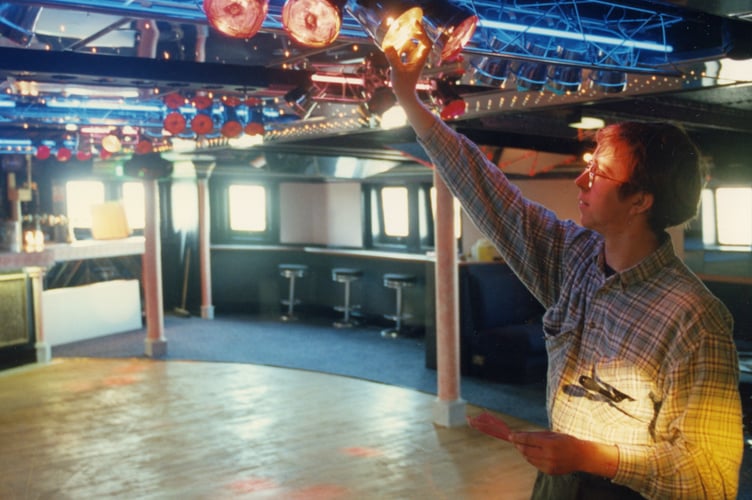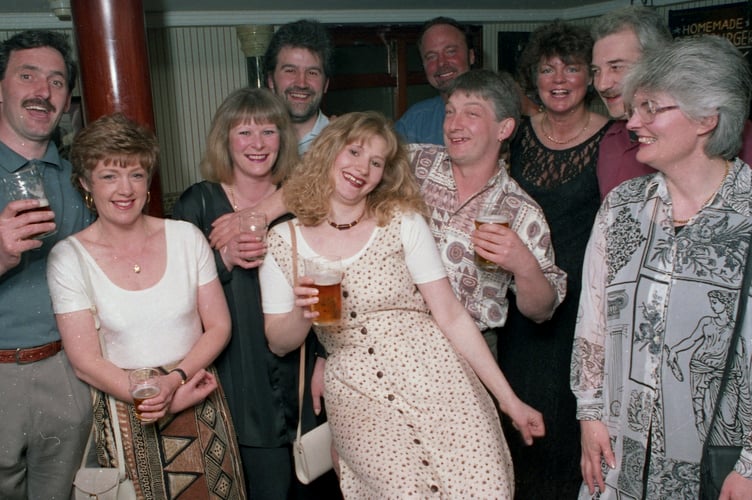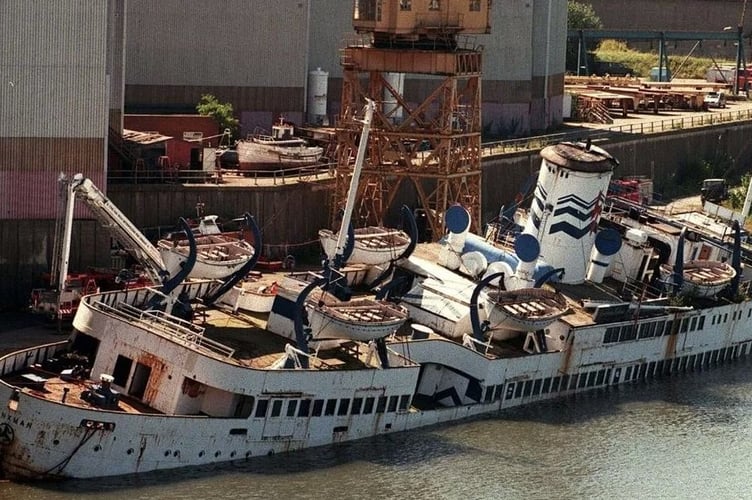The Manxman was once the queen of the Irish Sea and a jewel in the crown of the Isle of Man Steam Packet Company.
Driven by steam turbines, she powered along routes from the Isle of Man to ports in north west England, north Wales, Ireland and southern Scotland.
But she would later go on to endure a rather chequered history and an ignominious end after her final sailing in 1982.
The Manxman was built in 1955 and proudly served the island for almost 30 years.
The vessel was even cast in the role of RMS Carpathia for the 1979 film S.O.S. Titanic.
.jpeg?trim=0,58,0,382&width=752&height=500&crop=752:500)
The Isle of Man Steam Packet Company announced that 1982 would be the Manxman's last year in Steam Packet service.
The ship was offered to the Manxman Steamer Society who ran a Liverpool to Douglas day excursion entitled Steam All The Way. On arrival at Douglas, passengers were able to travel by steam train to Port Erin on the Isle of Man Railway.
On September 4, 1982, Manxman departed Liverpool with her last ever sailing for the Isle of Man Steam Packet.
That evening departure the Manxman left Douglas behind for good. With the Onchan Silver Band playing, and a flotilla of small vessels accompanying her, she set sail for Liverpool one last time. After arrival, she was to be laid up at Birkenhead.
Later that month it was announced the Manxman had been saved from the scrap heap by Marda (Squash) Ltd who purchased her for a sum in the region of £100,000 as the centrepiece of a new leisure complex at Preston Docks.
Manxman's new owners intended to convert her into a floating museum and visitor centre but it was not successful and the ship was turned into a floating nightclub and restaurant.
Before moving to Preston docks she was used as a location for the film Yentl with Barbra Streisand for a second moment in the spotlight.
In 1991 she was towed to Liverpool in 1991 where once again she was to be used as a floating nightclub in the Trafalgar Docks area.

Her demise came amid shady goings on when she travelled to Hull. For the few short years she operated as a bar and restaurant and proved hugely popular but the Manxman hit rocky shores.
Hundreds of people flocked to the former steamship based at the Ruscadors dry dock on the River Hull during the mid-1990s.
All seemed to be going well but there was one sticking point which was to prove its downfall. The owners could not get the crucial late-night drinks licence and was, instead, promoted as Britain's biggest pub, capable of holding 1,500 revellers.
But the drinks restrictions meant its six bars, two discos and restaurant could not trade to their full potential.
Despite its popularity with a mainly over-25s audience and a 6,000-name petition of support for a licence extension, there was strong opposition from local residents.

The Manxman soldiered on as a pub but closed in 1996 with the loss of 67 full and part-time jobs.
It was to get worse as a fire destroyed much of the Manxman’s interior a year after its closure. By this stage, she had become an attraction for vandals and yobs.
But the sinking of the Manxman’s fortunes can be identified much higher up the chain of command.
Owner Michael Kollakis did not appear to have the business acumen to really make the quirky nightspot a success. He lived a champagne lifestyle while his business headed for the rocks.
The sole director of Mid-Nite Entertainments liked to be called 'Captain' and lived in luxury in rented apartments.

But although he belonged to a Greek family shipping empire, he shared none of the money-making skills of his multi-millionaire brother Lou while at the helm of the Manxman. The wealthy Kollakis family bankrolled his disastrous venture as it ran up huge debts.
As his enterprise floundered, a creditors’ meeting took place in August 1997 but they were left fuming when Mr Kollakis did not attend.
Before arriving in Hull, Mr Kollakis was a director of Manxman Leisure, the former owners of the vessel when it was berthed in Liverpool.
It later ceased trading in Merseyside and administrators were appointed by the Kollakis family. The buyer of the vessel was Mid-Nite Entertainments.
In a fraught year for Mr Kollakis in 1995, a relative was given a community service sentence at Southwark Crown Court after admitting conspiracy to commit fraud by swindling rich Americans out of £53,000 selling old English titles which they believed would bring them close to royalty.

One New York attorney thought that by buying the title Lord of Bradley and the Moors, he was entitled to travel in an 18th century carriage in the Queen Mother's birthday procession.
The managing director of one major creditor told the Mail at the time: ‘The Manxman has been a disaster for Hull from the start. It was welcomed into the city because firms were desperate for business.
‘They have owed us money since the first day the ship was in the dry dock.'’
The Manxman left behind a pile of unpaid bills and was due to head for a new home, supposedly in Edinburgh, to undergo a £1.5 million transition to a floating nightspot.
But it sat in the dock abandoned for a number of months which started to attract antisocial behaviour.
Police warned the vessel was becoming a dangerous playground for intruders after a blaze destroyed a bar area, known as ‘The Directors Suite’, at the rear of the vessel.
It is not clear if she ever made it to Edinburgh but the Manxman ended up in Sunderland to undergo renovation.

In around 2000, the preservation group ‘The Manxman Steamship Company’ was formed with the aim of securing the historic ship.
A charity cruise aboard the Isle of Man Steam Packet Company’s Lady of Mann took place to raise funds for the Manxman, and celebrities including Ken Dodd, Paul O’Grady and Tom O’Connor signed up in support.
But she almost capsized after taking on water during the renovation work at the Sunderland shipyard. The 2,500-tonne Manxman was listing at 45 degrees at its moorings in the Pallion Engineering shipyard on the River Wear.
Yard workers and around 75 firefighters battled to stop the former Isle of Man ferry from sinking.
Despite a campaign to try and restore and preserve the Manxman, the ship was finally broken up for scrap in 2012.


.jpeg?width=209&height=140&crop=209:145,smart&quality=75)

